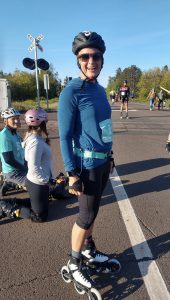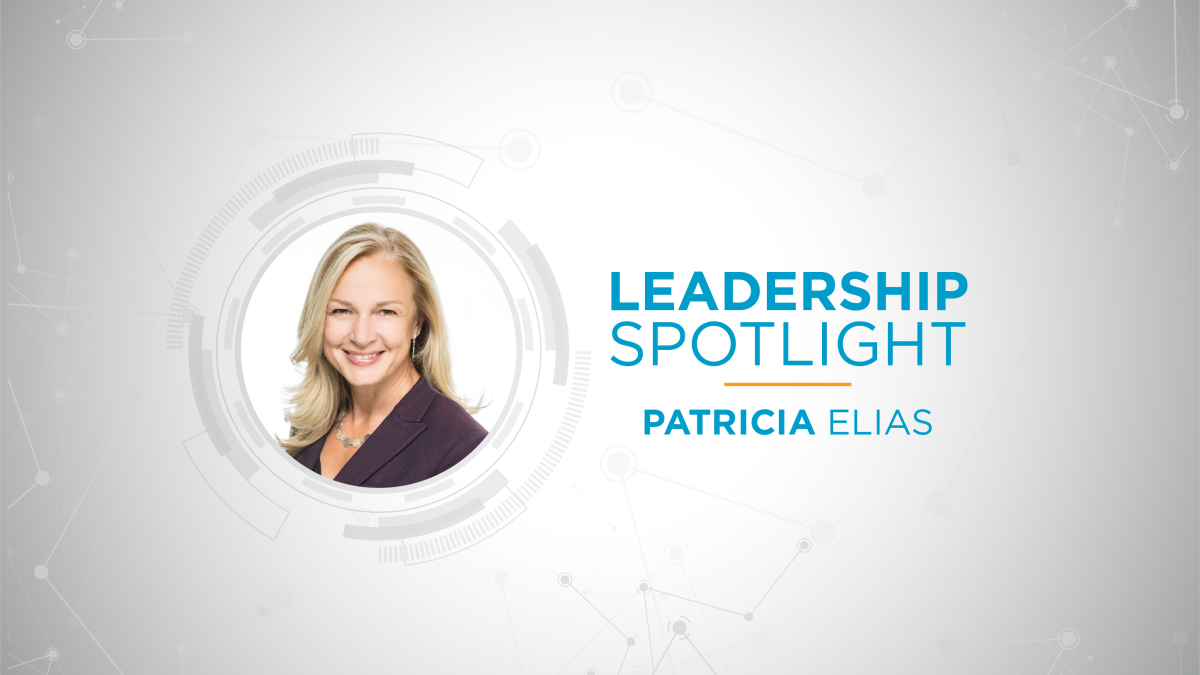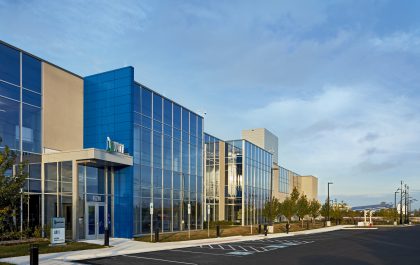A New Approach to HR: Creating Better Humans in the Workplace
At many organizations, the human resources (HR) department is not necessarily known for its innovation but rather for leading employee benefits and payroll. Yet a new generation of HR leaders, including Vantage Data Centers’ Chief People and Culture Officer Patricia (Tricia) Elias, are revolutionizing the way we think about HR and changing that perception by focusing on the whole person.
Tricia’s professional and personal mission is to “create better humans” by giving employees the tools they need to be happy and fulfilled in the workplace. She’s accomplishing this by championing Vantage’s Justice, Equity, Diversity and Inclusivity (JEDI) Council and introducing initiatives such as new onboarding and leadership development programs. Through these new and exciting initiatives, Tricia is upholding another one of her core values, connection, as the company continues its exponential growth around the globe.
For our next Leadership Spotlight series, we sat down with Tricia to talk about how her previous experience as an attorney and her personal core values have prepared her for the role as chief people and culture officer at Vantage Data Centers. We also explored the challenges and opportunities that HR faces when recruiting and retaining top talent for a rapidly growing, global organization.
Here is what Tricia had to say:
Data Centers Today (DCT): Can you tell our readers about your role as the chief people and culture officer at Vantage Data Centers?
Tricia Elias: The role of the HR department and the chief people officer has undergone a significant shift in the past five years. The HR department used to be viewed as a back office, transactional function to process hiring and terminations. But in recent years, the importance of people and culture in organizations has taken a much more front-and-center role.
This shift has come generationally. We’re seeing workers who are earlier in their career journeys come into the workforce with different perspectives in terms of purpose and flexibility. This shift started even before COVID. But the COVID pandemic accelerated this trend with companies saying, “We actually do need our employees to be here and be happy, and we need to take care of them.” It’s quite profound.
Yes, we need to maintain the foundational compliance, equity and performance management that is traditional HR. But the evolution is really about the whole person—not only ensuring that employees feel comfortable bringing their whole selves to work, but that the organization helps leaders coach and develop the whole person as well.
I see my role on the people and culture team as fostering good humans—making sure that our employees are not only happy in their work but have the tools and skill sets they need to be better partners, sisters, brothers, friends, children and parents; and all the things that contribute to our world and our communities in a better way. Because, fundamentally, the skills people learn at Vantage should apply to their lives. If someone is happy at Vantage, they’re likely to be happier outside of their job.
We are humans first, and making sure that people can not only bring their whole selves to work, but then take their whole selves home, is super important.
DCT: You started your career as an attorney. What made you want to transition to human resources? Was it a challenging transition?
Tricia Elias: In my prior role as chief legal officer, I always made an effort to partner with the business and ensure that the legal team enabled and drove the business forward, and this customer-focused approach is why I was asked to step in and lead the global HR function at my prior firm. It took me about six months to get my feet under me and understand the full spectrum of opportunities in the HR function—supported by a terrific team of leaders and HR professionals along the way.
Given the shifting role of the people team in today’s business, I do believe that the HR role benefits from different perspectives (as does any business). The role of the HR team doesn’t stop at compliance and transactions, and we constantly ask how we as the HR team support the goals and strategy of the business? How can we be more efficient? How can we use data-driven insights to make our decisions?
When we think about what brings true purpose and meaning to work, it’s important to reflect on our personal core values. One of my personal core values is connection—and although I certainly had lots of opportunities for connection as the general counsel, the opportunity for connection is far larger on the HR side. The ability to truly understand the stories and motivations of our people and then implement tools, systems or just a listening ear to help others be successful is exactly where I want to be. To be fair, I use my legal training every day—after almost 25 years of being a practicing corporate/securities attorney, that’s hard to leave behind—but I like to think it makes me a better HR leader as well.
We are humans first, and making sure that people can not only bring their whole selves to work, but then take their whole selves home, is super important.
DCT: You’ve been with Vantage for about eight months now. What initiatives are you working on? Can you share with our readers your biggest challenge and your biggest accomplishment to date?
Tricia Elias: When looking at the spectrum of HR that I manage, there’s always multiple competing priorities. The first priority for Vantage is leadership development. Vantage has grown quickly, so we have a lot of new leaders. Creating a comprehensive and personal leadership development program is one of the big initiatives for us this year. This program is a 40-week series of small group cohort meetings based on the ‘’leader as coach” concept.
What we’re doing here is enabling our leaders to handle ever-changing situations, both in their work and in their personal lives, keeping in mind that the business we’re leading today might be radically different from the business we’re leading in five years, and we need to enable our managers to approach these changing situations with grace and empathy. We are giving leaders these tools to allow them to be leaders who can manage themselves, others and culture, while also being a good human. Those fundamental leadership principles will transform the way we lead Vantage and give everyone that common language of leadership versus management.
The second thing we’re working on is onboarding and rolling out the welcome mat for new hires. We’re targeting this initiative to provide resources to managers and new hires alike, creating communities and cohorts for knowledge sharing and connection around the globe, and offering white-glove service to ensure our new Vantage team members are as excited to join as we are to have them—that they are able to quickly be productive and be a contributing member of their team. We are growing so quickly, when we take all the time to find the right talent, we need to make sure we take excellent care of them when they start.
As Vantage grows, in addition to our Leadership Unlocked training and our Vantage Welcome program, I’m super proud of our JEDI (Justice, Equity, Diversity and Inclusion) Council and our recently-launched employee resource groups. Our Women’s Leadership Forum hosted a terrific session for International Women’s Day, and we learned a lot about Ramadan and had dates delivered to our offices thanks to our Muslim Employee Network. We are looking forward to creating more opportunities to get to know our fellow employees and create community through our resource groups as the year progresses. I personally am co-executive sponsor of the Mental Health and Wellbeing Network and am passionate about ensuring that our employees know “it’s okay not to be okay,” and have a community to not only share but also to strategize on how to make Vantage even more welcoming.
One of a business’s persistent challenges is to define who we are, who we are to each other and how we show up for each other.
DCT: Vantage is a company that has grown exponentially over the past few years. What culture challenges are created by this kind of growth? How has your previous experiences prepared you to navigate Vantage’s ever-growing, decentralized employee base?
Tricia Elias: The minute that a business is no longer on one floor of one building, when everyone is working shoulder to shoulder, then you have to start thinking mindfully about how you define your culture and what you expect from your colleagues and your teammates. The COVID pandemic forced us to be deliberate about things that we as leaders may have taken for granted—such as being able to define culture and expectations, or managing people through performance not simply in-person presence. In addition, we had to learn to manage some teams in-person and some teams remotely. All these new muscles were being exercised—and continue to be exercised as we continue with a flexible workplace where possible.
Seeing that shift relatively early in my HR career underscored the importance of providing simple expectations and frameworks. These frameworks enable people to understand what is expected of them when they come to work. One of a business’s persistent challenges is to define who we are, who we are to each other and how we show up for each other.
We will hire 350 or more new people in 2023. As we grow, it’s incredibly important to provide the framework, roll out the welcome mat and say, ”Here’s what we expect.” The silver lining of the pandemic is that a lot of people understand this now and why it’s important. Another silver lining is the ability for businesses to allow people in certain roles to work remote some or all of the time. At Vantage, a significant portion of our workforce is required to be on-site every day to manage our data centers and offices. However, we recognize that providing flexibility for other roles that can be accomplished remotely is an important aspect of ensuring that our people find the work-life integration that works for them, while ensuring our offices are vibrant and welcoming spaces that drive community and connection.
DCT: The data center industry continues to grow despite some of the big tech layoffs we are seeing in the news. How are you approaching recruiting new team members? How are you thinking about expanding your diverse workforce?
Tricia Elias: With many of the layoffs we’re seeing, you might think this is suddenly an employer’s market. It’s really not. The competition for talent, especially for the roles Vantage needs to hire, remains intense. So, how do we recruit the best talent?
We have been partnering with our marketing team to ensure that people know about our employer brand. This includes communicating not only what we do, but who we are. We have a fantastic collection of employees here and making sure that message gets out is a key part of our recruitment efforts.
The other part is that we must be deliberate and mindful about recruiting. The talent acquisition team has developed strategies for specifically targeting underrepresented groups to make sure that our candidate pipeline has the best talent from across the globe. By using these diverse strategies, we ensure that we create a pipeline that is representative of our client base and the communities we live and work in. For example, we recently attended the Project H.I.T. talent acquisition fair, which places veterans in internship or apprenticeship roles.
DCT: I understand you are an “inline skating evangelist.” Can you tell us a little more about this hobby?

Tricia Elias: Inline skating is an amazing way to see the world and get a good workout. It’s good cardio, balance, core work and a conversation starter, and is easy on the joints, too. There’s nothing like going really fast down a road on your skates. It truly makes you feel like you’re flying.
DCT: What is the best piece of advice you’ve ever received and who offered it to you?
Early in my legal career, one of my leaders had a framed quote on her wall: “Hard work beats talent when talent doesn’t work hard.” This has become a family saying at our house—the recognition that the foundation for success is hard work. However, if you hate what you’re working on, then that’s not going to be a fun journey. This is why I combine it with another piece of advice, “do what you love,” which I operationalize by constantly evaluating my personal core values and doing the work that fits best with them. I’m absolutely delighted to get to lead a people and culture team at Vantage that helps me connect with those core values each day and make the world a better place by helping all Vantage team members be happy and healthy–giving them the tools they need to find success and joy.



